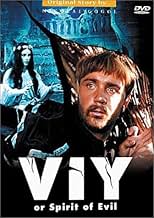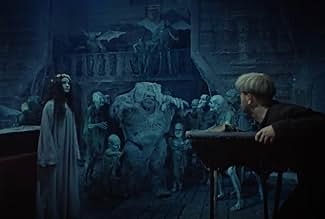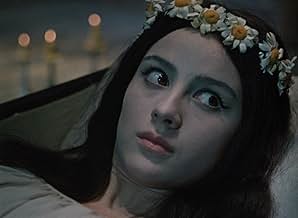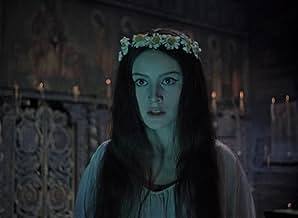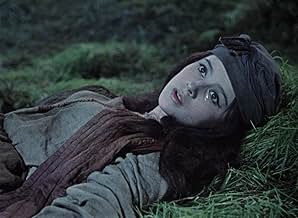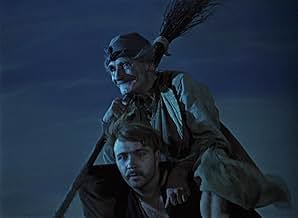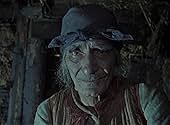AVALIAÇÃO DA IMDb
7,2/10
11 mil
SUA AVALIAÇÃO
Um jovem padre é ordenado a presidir o velório da bruxa em uma pequena igreja de madeira em uma aldeia remota. Isto significa passar três noites sozinho com o corpo apenas com sua fé para pr... Ler tudoUm jovem padre é ordenado a presidir o velório da bruxa em uma pequena igreja de madeira em uma aldeia remota. Isto significa passar três noites sozinho com o corpo apenas com sua fé para protegê-lo.Um jovem padre é ordenado a presidir o velório da bruxa em uma pequena igreja de madeira em uma aldeia remota. Isto significa passar três noites sozinho com o corpo apenas com sua fé para protegê-lo.
- Direção
- Roteiristas
- Artistas
Natalya Varley
- Pannochka
- (as N. Varley)
Aleksey Glazyrin
- Sotnik
- (as A. Glazyrin)
Nikolay Kutuzov
- Witch
- (as N. Kutuzov)
Vadim Zakharchenko
- Khalyava
- (as V. Zakharchenko)
Pyotr Vesklyarov
- Prncipal of the Seminary
- (as P. Vesklyarov)
- …
Vladimir Salnikov
- Gorobets
- (as V. Salnikov)
Dmitriy Kapka
- Overko
- (as D. Kapka)
Stepan Shkurat
- Yavtukh
- (as S. Shkurat)
Georgiy Sochevko
- Stepan
- (as G. Sochevko)
Nikolay Yakovchenko
- Spirid
- (as N. Yakovchenko)
Nikolay Panasev
- Comforter
- (as N. Panasev)
Borislav Brondukov
- Seminarian
- (não creditado)
Aleksandra Denisova
- Peasant
- (não creditado)
Lyubov Kalyuzhnaya
- Peasant
- (não creditado)
Viktor Kolpakov
- Peasant
- (não creditado)
Mikhail Kramar
- Seminarian
- (não creditado)
Margarita Krinitsyna
- Gafiyka
- (não creditado)
Avaliações em destaque
This was one of several fantasy films released by the DVD label RusCiCo (Russian Cinema Council) to promote classics in the field which would seldom have traveled outside their native land; it remains the only one I have watched (though I own quite a few) and, for the record, my second acquaintance with it came via a copy off "You Tube" rather than the extras-laden disc itself as a complementary viewing to Mario Bava's BLACK Sunday (1960) – since both films were inspired by the Nikolai Gogol tale "The Vij".
Needless to say, this version is much closer to the source material but this does not make it the better rendition; truth be told, many horror classics have been loosely adapted to the screen and, yet, the end result has been wholly embraced by critics and fans alike (say, James Whale's FRANKENSTEIN {1931}, Terence Fisher's Dracula {1958}, or any of Roger Corman's efforts inspired by the work of Edgar Allan Poe). Bava's film rightly placed the witch at the center of the narrative (amazingly, almost without her ever emerging from the family crypt!) whereas this film – and, one assumes, the original text – makes the frankly boring seminarian hero its protagonist. At just 72 minutes, the movie certainly does not overstay its welcome – but it also somewhat exposes the essentially thin plot line: a young man is helped by an old lady, but he understandably snubs her unwarranted advances; however, he allows her to ride him piggyback(!) only for them to slowly rise off the ground, revealing her to be a witch. Back on firm land, the aspiring cleric beats up the woman, who turns to her true form of a young girl – after which the boy flees the scene. As soon as he reports back to the seminary, he is told to travel to the estate of a prominent local family to pray over the body of their dying daughter; when he arrives, it transpires not only that the afflicted party is the witch herself (who expressly asked for him to be there!) but that she had succumbed to her wounds. Tradition now binds him to make a 3-night vigil over her corpse but her plan is to exact revenge by tormenting him with assorted supernatural occurrences that, inevitably, lead to his own demise (which proves just-as-baffling to outsiders, especially as he seems to be getting old before his time)!
The film looks very handsome in colour, and the striking special effects work by "artistic director" Aleksandr Ptushko are at once charming and sinister; still, these are mainly relegated to the final night – as the first two go by a bit too quickly, serving only for the revivified girl to repeatedly attempt in breaking the chalk-drawn circle inside which the young man has managed to attain sanctuary (once using the coffin itself as a battering ram!). The parade of grotesques at the end include the briefly-seen titular creature, which is not averse to being used as comedy relief – since the Vij asks its acolytes to fold out its overgrown ears because they are obstructing its field of vision i.e. their intended prey! Unsurprisingly, the movie is Russian to the bone – so that we get much carousing (singing, drinking and camaraderie) throughout – which tends to deflect attention from the otherwise nicely- handled genre trappings and brings me back to the notion that, sometimes, foreign-made versions of any given tale can have a better chance of externalizing its core themes.
Needless to say, this version is much closer to the source material but this does not make it the better rendition; truth be told, many horror classics have been loosely adapted to the screen and, yet, the end result has been wholly embraced by critics and fans alike (say, James Whale's FRANKENSTEIN {1931}, Terence Fisher's Dracula {1958}, or any of Roger Corman's efforts inspired by the work of Edgar Allan Poe). Bava's film rightly placed the witch at the center of the narrative (amazingly, almost without her ever emerging from the family crypt!) whereas this film – and, one assumes, the original text – makes the frankly boring seminarian hero its protagonist. At just 72 minutes, the movie certainly does not overstay its welcome – but it also somewhat exposes the essentially thin plot line: a young man is helped by an old lady, but he understandably snubs her unwarranted advances; however, he allows her to ride him piggyback(!) only for them to slowly rise off the ground, revealing her to be a witch. Back on firm land, the aspiring cleric beats up the woman, who turns to her true form of a young girl – after which the boy flees the scene. As soon as he reports back to the seminary, he is told to travel to the estate of a prominent local family to pray over the body of their dying daughter; when he arrives, it transpires not only that the afflicted party is the witch herself (who expressly asked for him to be there!) but that she had succumbed to her wounds. Tradition now binds him to make a 3-night vigil over her corpse but her plan is to exact revenge by tormenting him with assorted supernatural occurrences that, inevitably, lead to his own demise (which proves just-as-baffling to outsiders, especially as he seems to be getting old before his time)!
The film looks very handsome in colour, and the striking special effects work by "artistic director" Aleksandr Ptushko are at once charming and sinister; still, these are mainly relegated to the final night – as the first two go by a bit too quickly, serving only for the revivified girl to repeatedly attempt in breaking the chalk-drawn circle inside which the young man has managed to attain sanctuary (once using the coffin itself as a battering ram!). The parade of grotesques at the end include the briefly-seen titular creature, which is not averse to being used as comedy relief – since the Vij asks its acolytes to fold out its overgrown ears because they are obstructing its field of vision i.e. their intended prey! Unsurprisingly, the movie is Russian to the bone – so that we get much carousing (singing, drinking and camaraderie) throughout – which tends to deflect attention from the otherwise nicely- handled genre trappings and brings me back to the notion that, sometimes, foreign-made versions of any given tale can have a better chance of externalizing its core themes.
Viy is based on the same story, written by Nikolai Gogol, that inspired Mario Bava's masterpiece, Black Sunday. While the films have some similarities; for example, a witch and a fairytale atmosphere; the two really aren't much alike. Black Sunday went more for the straight horror, and was a better film for it. Viy is more of a religious themed film, and the witch plot line offers more in the way of the faith of the lead character than actual horror. The film has a massive amount of cult value, mostly due to the fact that it's not much like any other movie in terms of its style. The music and atmosphere combine to give it an other-worldly feel, and this helps massively where the plot is concerned. The basis of the film follows a man of God who must spend three days and three nights presiding over the corpse of a young girl, who also happens to be the local witch. Being dead isn't much of a hindrance to the witch, as she bombards our hero with black magic. With only his faith to protect him; will he be able to last three nights with her corpse?
The first half of the movie is really rather dull, as not a lot happens and it seems to mostly be a set-up for the latter section. The plot does pick up as the film goes on; but the film is never massively engaging, and that is its main downfall. However, the cinematography is great; and Viy has a very vibrant feel throughout. Black Sunday had a similar vibrant feel; and this film gives the viewer an idea of what Bava's film might have looked like in colour. The scenes that take place inside the church are the movie's main strongpoint, thus making it a shame that there aren't more of them. These scenes look great and brilliantly offset the gentle tone of the rest of the film. The climax delivers the best part of the movie, and the special effects there, while obviously cheap, look stunning and brilliantly suit the style of the film. Russia isn't very well known for its film industry, and this was one of the first horror films produced in the Soviet Union. Modern flick Night Watch has given the Russian film industry a new lease of life recently; and this film, like most other classics, is set for a remake. Oh well...I recommend Viy mainly to fans of art-house cinema.
The first half of the movie is really rather dull, as not a lot happens and it seems to mostly be a set-up for the latter section. The plot does pick up as the film goes on; but the film is never massively engaging, and that is its main downfall. However, the cinematography is great; and Viy has a very vibrant feel throughout. Black Sunday had a similar vibrant feel; and this film gives the viewer an idea of what Bava's film might have looked like in colour. The scenes that take place inside the church are the movie's main strongpoint, thus making it a shame that there aren't more of them. These scenes look great and brilliantly offset the gentle tone of the rest of the film. The climax delivers the best part of the movie, and the special effects there, while obviously cheap, look stunning and brilliantly suit the style of the film. Russia isn't very well known for its film industry, and this was one of the first horror films produced in the Soviet Union. Modern flick Night Watch has given the Russian film industry a new lease of life recently; and this film, like most other classics, is set for a remake. Oh well...I recommend Viy mainly to fans of art-house cinema.
Minimalistic story, minimalistic effects, amazing result. This what you' ll find watching the first Russian horror movie. A totally unusual movie, with an amazing atmosphere. I found it absolutely interesting to watch. I felt like exploring a new world.
Of course the movie isn't perfect. Of course most effects look odd and cheap. Yet, it's an interesting visual experience. It has beautiful nature pictures in it, and a few seriously impressive effects and a great set.
This movie is totally unusual and odd. It'll not be to the liking of most modern watchers. If you like watching the unusual (like me), this movie is for you.
Of course the movie isn't perfect. Of course most effects look odd and cheap. Yet, it's an interesting visual experience. It has beautiful nature pictures in it, and a few seriously impressive effects and a great set.
This movie is totally unusual and odd. It'll not be to the liking of most modern watchers. If you like watching the unusual (like me), this movie is for you.
Although the film starts off a bit in the fairy tale fashion, the film doesn't lack anything a great sixties horror movie, be it from Italy, England or the U.S. should have. I think it's wonderful that a Russian gem like this got re-released in the US, so that I could see it in Germany. If this movie had been distributed better, I think it would turn up in every horror movie history besides the works of Bava (yes, MASCHERA DEL DEMONIO was based on the same story...although the Russian version sticks a lot more to Gogol) and the Hammer and Roger Corman Productions. If you're a fan of atmospheric sixties horror, you definitely should see this one, if only for the unforgettable climax.
Viy is perhaps too short and has a slow start but when you stick with it it is really an excellent film that is very Russian in flavour and does its fantasy and horror elements in a most effective way. The scenery is both sumptuous and foreboding, so good in fact that you wish you were there. The film is lovingly shot and the special effects are certainly above-average with Aleksandr Ptushko's(also director of some of the best Russian fantasy films seen by me) style all over them. Another outstanding element is the music, it sets the atmosphere of the film brilliantly, at times lyrical and others surreal. Some have remarked about the influence of composers like Mussorgsky, Prokoviev and Rachmaninov and it's definitely there, the scoring of the creepy and surreal moments in particular have a very Mussorgsky-like wonderful weirdness. The dialogue is witty and thought-provoking, the Tolstoy and Poe comparisons remarked in a previous review are apt as well. The story engages throughout, the fantasy gives a real sense of wonder, the sense of adventure is exciting at least and the horror elements are appropriately creepy and unsettling. The characters are ones you have seen before but they really help to carry the film, fit in the atmosphere very well, have personality and all serve a point in some way to the story. All the characters are enthusiastically performed, sometimes with a tendency to be a tad over-theatrical but this is not uncommon for Russian/Soviet fantasy and especially from the 60s and it doesn't hurt things in any shape or form. To conclude, Viy is excellent and well worth watching if not quite a personal favourite. 8/10 Bethany Cox
Você sabia?
- CuriosidadesNikolay Stepanov who plays the demon Viy, was a circus artist. He was cast for his strength, because costume of the creature was extremely heavy.
- Erros de gravaçãoWhile stopping at the inn for food and vodka (on the way to Sotnik's village) the horses are taken off the carriage, fed and watered too, but in between the shots of the horses, firstly, being watered and then fed, we still see them attached to the carriage between shots.
- ConexõesFeatured in Woodlands Dark and Days Bewitched: A History of Folk Horror (2021)
- Trilhas sonorasNight on Bald Mountain
Composed by Modest Mussorgsky
Principais escolhas
Faça login para avaliar e ver a lista de recomendações personalizadas
- How long is Viy?Fornecido pela Alexa
Detalhes
Contribua para esta página
Sugerir uma alteração ou adicionar conteúdo ausente

Principal brecha
By what name was Viy - A Lenda do Monstro (1967) officially released in India in Hindi?
Responda

